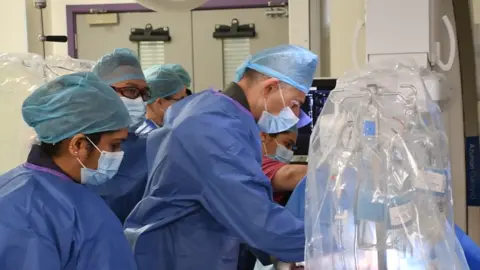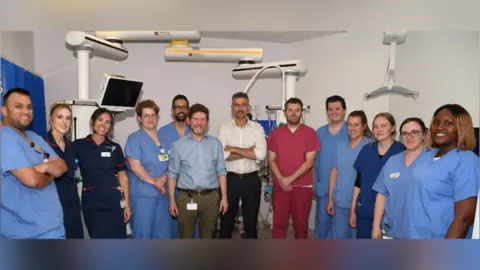New treatment for heart valve disease in the East
 Royal Papworth Hospital NHS Foundation Trust
Royal Papworth Hospital NHS Foundation TrustPatients received a new treatment for heart valve disease, which did not require riskier open-heart surgery or travel to London.
Five people from Cambridgeshire, Essex, Hertfordshire, Peterborough and Suffolk had the minimally invasive procedure at the Royal Papworth Hospital in Cambridge.
It saw them treated for aortic valve regurgitation, which is when blood flows the wrong way through the heart, causing breathlessness, chest pain, fatigue and a fluid build-up.
Mary Baker, 79, said she received a transcatheter aortic valve implantation (TAVI) on a Monday and was home by teatime on the Wednesday.
 Royal Papworth Hospital NHS Foundation Trust
Royal Papworth Hospital NHS Foundation TrustMs Baker from Bishop's Stortford in Hertfordshire was treated in May 2025 and said she was "feeling a thousand percent better".
It was deemed too risky to fix her leaky heart valve with open heart surgery, so she had a TAVI fitted at the Cambridge hospital.
"I used to play golf and go to the gym two to three times a week, but my condition built up gradually, and I was feeling really poorly because my valve was leaking quite badly," she said.
"I was so short of breath all the time – I could barely walk a few yards without stopping, and even talking to people was hard."
Since her treatment, she had started driving again and planned to get back to playing golf and going to the gym.
Royal Papworth Hospital NHS Foundation Trust was the only hospital in the East of England, and one of a few in the UK, using the Trilogy valve technology.
 Royal Papworth Hospital NHS Foundation Trust
Royal Papworth Hospital NHS Foundation TrustAnother patient, a 76-year-old woman from Leigh-on-Sea in Essex, also underwent the procedure in May and has noticed a big improvement in her breathing.
She explained: "Beforehand, I couldn't walk very far, and I couldn't do quite a few things around the house because I was getting out of breath so quickly.
"Having the Trilogy TAVI valve has really improved my quality of life. I've just had a wander around the supermarket and bought some groceries, and I came home and unpacked everything from the car."
Dr Charis Costopoulos said: "These patients now can have definitive treatment here.
"Previously, people who were deemed inoperable would bounce in and out of hospital with little quality of life between admissions.
"It also means that high-risk patients who would otherwise have surgical aortic valve replacement as their only option can now be treated minimally invasively, resulting in reduced hospital length of stay and much quicker recovery."
Follow East of England news on X, Instagram and Facebook: BBC Beds, Herts & Bucks, BBC Cambridgeshire, BBC Essex, BBC Norfolk, BBC Northamptonshire or BBC Suffolk.
